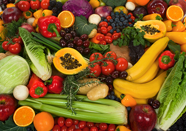
Best Bites for Sight (part 1)
There is a lot of data out there about what foods and nutrients are good for vision health. Today’s post will highlight some of that research, with more to come later.
FRUIT:
Data reported in a study published in the June 2004 issue of the Archives of Ophthalmology indicates that eating 3 or more servings of fruit per day may lower your risk of age-related macular degeneration (ARMD), the primary cause of vision loss in older adults, by 36%, compared to persons who consume less than 1.5 servings of fruit daily.
In this large-scale study, which involved over 110,000 participants, researchers evaluated the effect of study participants’ consumption of fruits, vegetables, antioxidant vitamins (A, C, and E), and carotenoids on the development of early ARMD or neovascular ARMD, a more severe form of the illness associated with vision loss. Food intake information was collected periodically for up to 18 years for women and 12 years for men.
Many fruits, including berries, also contain flavonoid phytonutrients, which may play an important role in protecting eye health. They not only serve as antioxidants and therefore protect the eye from free radical damage, but they help to support the strength and integrity of the capillaries that channel blood to the eyes.
LUTEIN and ZEAXANTHIN CAROTENOIDS:
The eyes are repositories for carotenoids with lutein and zeaxanthin concentrated in the retina and lens. Observational studies have noted that higher dietary intake of lutein and zeaxanthin is related to reduced risk of cataracts and age-related macular degeneration, two eye conditions for which there are minimal options when it comes to effective prevention. Researchers speculate that these carotenoids may promote eye health through their ability to protect the eyes from light-induced oxidative damage and aging through both their antioxidant actions as well as their ability to filter out UV light. Rich sources of lutein and zeaxanthin include eggs, kale, spinach, turnip greens, collard greens, romaine lettuce, broccoli, zucchini, corn, garden peas, and Brussels sprouts.
*****
photo courtesy of Flikr
Have a thought about this article? Contact Us and let us know.